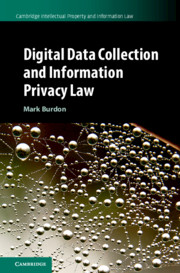Book contents
- Digital Data Collection and Information Privacy Law
- Cambridge Intellectual Property and Information Law
- Digital Data Collection and Information Privacy Law
- Copyright page
- Dedication
- Contents
- Figure and Tables
- Acknowledgements
- 1 Introduction
- Part I The Collected World
- Part II Information Privacy Law’s Concepts and Application
- Part III Information Privacy Law for a Collected Future
- 7 Collected Challenges
- 8 Conceptualising the Collected
- 9 Using Information Privacy Law to Interrupt Modulation
- 10 A Smart, Collected or Modulated World?
- Bibliography
- Index
- Cambridge Intellectual Property and Information Law
9 - Using Information Privacy Law to Interrupt Modulation
from Part III - Information Privacy Law for a Collected Future
Published online by Cambridge University Press: 04 April 2020
- Digital Data Collection and Information Privacy Law
- Cambridge Intellectual Property and Information Law
- Digital Data Collection and Information Privacy Law
- Copyright page
- Dedication
- Contents
- Figure and Tables
- Acknowledgements
- 1 Introduction
- Part I The Collected World
- Part II Information Privacy Law’s Concepts and Application
- Part III Information Privacy Law for a Collected Future
- 7 Collected Challenges
- 8 Conceptualising the Collected
- 9 Using Information Privacy Law to Interrupt Modulation
- 10 A Smart, Collected or Modulated World?
- Bibliography
- Index
- Cambridge Intellectual Property and Information Law
Summary
Chapter 9 examines how new forms of information privacy law could develop to interrupt modulated forms of power. It highlights some design points for future legal reform. The design points outline some key areas that would allow reforms to develop based on Julie Cohen’s work. The implementation of these principles would require some form of detachment from information privacy’s core process protections, so the law could apply in gaps and spaces at the outskirts of process. These gaps and spaces are important because this is where selfhood flourishes and would therefore be a prime target for modulated forms of data collection. The design points would allow protection of gaps and spaces through the construction of new boundary options that create pauses in seamless forms of data collection and analysis. All of this would assist in information privacy law’s new role in exposing modulation. The chapter contends that a greater focus on relational forms of personal information is needed along with a collection principle based on fairness. New legal vocabularies and new ways of incentivising value discourse, as well as compliance orientations, in data collecting institutions are required.
Keywords
- Type
- Chapter
- Information
- Digital Data Collection and Information Privacy Law , pp. 257 - 288Publisher: Cambridge University PressPrint publication year: 2020



